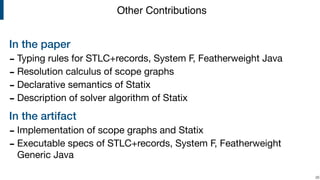The document outlines the Statix declarative type system specification, focusing on high-level language specification and type systems. It covers concepts like scope graphs, type predicates, and variable definitions through examples of arithmetic expressions, bindings, and module scope. The specification also describes various rules for name resolution, record types, and the implementation within the context of a typed program solver.
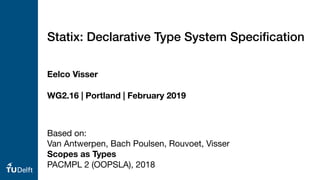
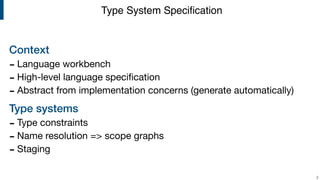
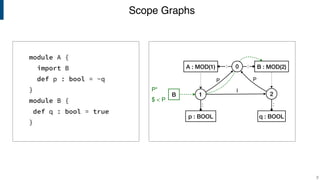
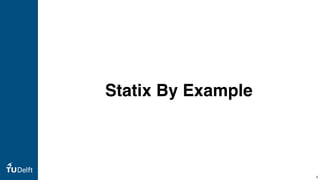
![Arithmetic Expressions: Concrete and Abstract Syntax
!5
context-free syntax // arithmetic
Exp.Int = <<INT>>
Exp.Add = <<Exp> + <Exp>> {left}
Exp.Sub = <<Exp> - <Exp>> {left}
Exp.Mul = <<Exp> * <Exp>> {left}
Exp.Eq = <<Exp> == <Exp>> {non-assoc}
constructors // arithmetic
Int : INT -> Exp
Add : Exp * Exp -> Exp
Sub : Exp * Exp -> Exp
Mul : Exp * Exp -> Exp
Eq : Exp * Exp -> Exp
SDF3 Statix
Program(
[Exp(
Add(Int("1"), Mul(Int("2"), Int("3")))
)]
)
> 1 + 2 * 3](https://image.slidesharecdn.com/statix-wg216-2019-02-190219213046/85/Declarative-Type-System-Specification-with-Statix-5-320.jpg)
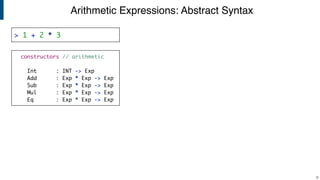
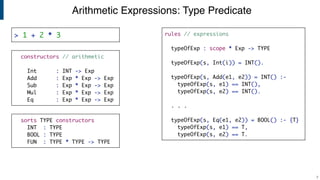
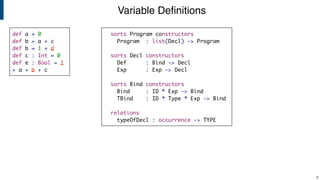
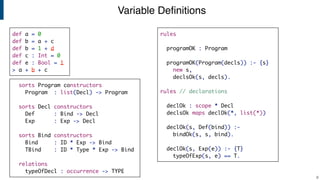
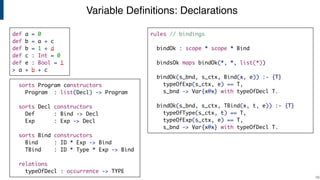
![Variable Definitions: Name Resolution
!11
rules // bindings
bindOk : scope * scope * Bind
bindsOk maps bindOk(*, *, list(*))
bindOk(s_bnd, s_ctx, Bind(x, e)) :- {T}
typeOfExp(s_ctx, e) == T,
s_bnd -> Var{x@x} with typeOfDecl T.
bindOk(s_bnd, s_ctx, TBind(x, t, e)) :- {T}
typeOfType(s_ctx, t) == T,
typeOfExp(s_ctx, e) == T,
s_bnd -> Var{x@x} with typeOfDecl T.
rules // variables
typeOfExp(s, Var(x)) = T :- {p d }
typeOfDecl of Var{x@x} in s |-> [(p, (d, T))].
sorts Program constructors
Program : list(Decl) -> Program
sorts Decl constructors
Def : Bind -> Decl
Exp : Exp -> Decl
sorts Bind constructors
Bind : ID * Exp -> Bind
TBind : ID * Type * Exp -> Bind
relations
typeOfDecl : occurrence -> TYPE
def a = 0
def b = a + c
def b = 1 + d
def c : Int = 0
def e : Bool = 1
> a + b + c](https://image.slidesharecdn.com/statix-wg216-2019-02-190219213046/85/Declarative-Type-System-Specification-with-Statix-11-320.jpg)
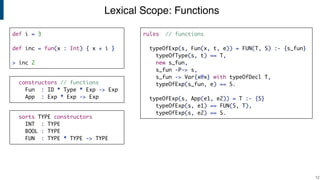
![Lexical Scope: Sequential Let
!13
rules // let bindings
typeOfExp(s, Let(binds, e)) = T :- {s_let}
new s_let,
sbindsOk(s, s_let, binds),
typeOfExp(s_let, e) == T.
def a = 0
def b = 1
def c = 2
> let
a = c;
b = a;
c = b
in
a + b + c
rules // bindings
sbindsOk : scope * scope * list(Bind)
sbindsOk(s, s_fin, []) :-
s_fin -P-> s.
sbindsOk(s, s_fin, [bind | binds]) :- {s_mid}
new s_mid, s_mid -P-> s,
bindOk(s_mid, s, bind),
sbindsOk(s_mid, s_fin, binds).](https://image.slidesharecdn.com/statix-wg216-2019-02-190219213046/85/Declarative-Type-System-Specification-with-Statix-13-320.jpg)
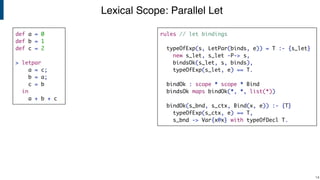
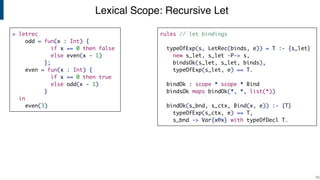
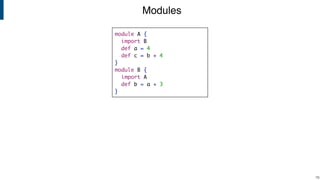
![Modules: Scopes as Types
!17
rules // modules
declOk(s, Module(m, decls)) :- {s_mod}
new s_mod, s_mod -P-> s,
s -> Mod{m@m} with typeOfDecl MOD(s_mod),
declsOk(s_mod, decls).
declOk(s, Import(m)) :- {p d s_mod}
typeOfDecl of Mod{m@m} in s |-> [(p, (d, MOD(s_mod)))],
s -I-> s_mod.
module A {
import B
def a = 4
def c = b + 4
}
module B {
import A
def b = a + 3
}
sorts TYPE constructors
INT : TYPE
BOOL : TYPE
FUN : TYPE * TYPE -> TYPE
MOD : scope -> TYPE
name-resolution
labels P I R
resolve Var filter pathMatch[P* (R* | I*)]
min pathLt[$ < I, $ < P, I < P, R < P]
resolve Mod filter pathMatch[P P* I*]
min pathLt[$ < I, $ < P, I < P, R < P]](https://image.slidesharecdn.com/statix-wg216-2019-02-190219213046/85/Declarative-Type-System-Specification-with-Statix-17-320.jpg)
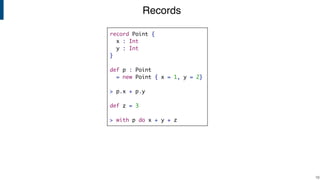

![Record Literals
!20
rules // records construction
typeOfExp(s, New(x, fbinds)) = REC(s_rec) :- {p d}
typeOfDecl of Var{x@x} in s |-> [(p, (d, REC(s_rec)))],
fbindsOk(s, s_rec, fbinds).
fbindOk : scope * scope * FBind
fbindsOk maps fbindOk(*, *, list(*))
fbindOk(s, s_rec, FBind(x, e)) :- {p d T}
typeOfExp(s, e) == T,
typeOfDecl of Var{x@x} in s_rec |-> [(p, (d, T))].
record Point {
x : Int
y : Int
}
def p : Point
= new Point { x = 1, y = 2}
> p.x + p.y
def z = 3
> with p do x + y + z
sorts TYPE constructors
INT : TYPE
BOOL : TYPE
FUN : TYPE * TYPE -> TYPE
REC : scope -> TYPE](https://image.slidesharecdn.com/statix-wg216-2019-02-190219213046/85/Declarative-Type-System-Specification-with-Statix-20-320.jpg)
![Record Projection
!21
rules // record projection
typeOfExp(s, Proj(e, x)) = T :- {p d s_rec S}
typeOfExp(s, e) == S,
proj(S, x) == T.
proj : TYPE * ID -> TYPE
proj(REC(s_rec), x) = T :- {p d}
typeOfDecl of Var{x@x} in s_rec |-> [(p, (d, T))].
record Point {
x : Int
y : Int
}
def p : Point
= new Point { x = 1, y = 2}
> p.x + p.y
def z = 3
> with p do x + y + z
sorts TYPE constructors
INT : TYPE
BOOL : TYPE
FUN : TYPE * TYPE -> TYPE
REC : scope -> TYPE](https://image.slidesharecdn.com/statix-wg216-2019-02-190219213046/85/Declarative-Type-System-Specification-with-Statix-21-320.jpg)
![With Record
!22
rules // with record value
typeOfExp(s, With(e1, e2)) = T :- {s_with s_rec}
typeOfExp(s, e1) == REC(s_rec),
new s_with,
s_with -P-> s, s_with -R-> s_rec,
typeOfExp(s_with, e2) == T.
record Point {
x : Int
y : Int
}
def p : Point
= new Point { x = 1, y = 2}
> p.x + p.y
def z = 3
> with p do x + y + z
sorts TYPE constructors
INT : TYPE
BOOL : TYPE
FUN : TYPE * TYPE -> TYPE
REC : scope -> TYPE
name-resolution
labels P I R
resolve Var filter pathMatch[P* (R* | I*)]
min pathLt[$ < I, $ < P, I < P, R < P]](https://image.slidesharecdn.com/statix-wg216-2019-02-190219213046/85/Declarative-Type-System-Specification-with-Statix-22-320.jpg)
![Type References
!23
record Point {
x : Int
y : Int
}
def translate : Point -> Point -> Point
= fun(p: Point){ fun(d: Point) {
new Point{
x = p.x + d.x,
y = p.y + d.y }
} }
def p : Point = new Point { x = 1, y = 2}
> translate(p)(p)
rules // types
typeOfType : scope * Type -> TYPE
typeOfType(s, IntT()) = INT().
typeOfType(s, BoolT()) = BOOL().
typeOfType(s, FunT(t1, t2)) =
FUN(typeOfType(s, t1), typeOfType(s, t2)).
typeOfType(s, RecT(x)) = REC(s_rec) :- {p d}
typeOfDecl of Var{x@x}
in s |-> [(p, (d, REC(s_rec)))].](https://image.slidesharecdn.com/statix-wg216-2019-02-190219213046/85/Declarative-Type-System-Specification-with-Statix-23-320.jpg)

![Implementation
!25
type point = {x : num, y : num} in
let mkpoint = fun(x : num) { {x = x, y = x} } in
type color = num in
type colorpoint =
{k : color} extends point in
let addColor =
fun(c : num) {
fun(p : colorpoint) {
({c = c} extends p) : colorpoint
}
} in
(addColor 6 ({c = 5} extends mkpoint 4)) : colorpoint
typeOfExp : scope * Exp -> Type
typeOfExp(s, Num(_)) = NUM().
typeOfExp(s, Plus(e1, e2)) = NUM() :-
typeOfExp(s, e1) == NUM(),
typeOfExp(s, e2) == NUM().
typeOfExp(s, Fun(x, te, e)) = FUN(S, T) :- {s_fun}
typeOfTypeExp(s, te) == S,
new s_fun, s_fun -P-> s,
s_fun -> Var{x@x} with typeOfDecl S,
typeOfExp(s_fun, e) == T.
typeOfExp(s, Var(x)) = T :-
query typeOfDecl filter pathMatch[P*(R|E)*] and { d :- varOrFld(x, d) }
min pathLt[$ < P, $ < R, $ < E, R < P, R < E] and true
in s |-> [(_, (_, T))].
typeOfExp(s, App(e1, e2)) = T :- {S U}
typeOfExp(s, e1) == FUN(S, T),
typeOfExp(s, e2) == U,
subType(U, S).
type point = {x : num, y : num} in
let mkpoint = fun(x : num) { {x = x, y = x} } in
type color = num in
type colorpoint =
{k : color} extends point in
let addColor =
fun(c : num) {
fun(p : colorpoint) {
({c = c} extends p) : colorpoint
}
} in
(addColor 6 ({c = 5} extends mkpoint 4)) : colorpoint
Program
Statix Specification
Typed Program
Solver
package mb.statix.solver;
import java.util.Iterator;
import java.util.List;
import java.util.Map;
import java.util.Optional;
import java.util.Set;
import java.util.stream.Collectors;
import javax.annotation.Nullable;
import org.immutables.value.Value;
import org.metaborg.util.functions.Predicate1;
import com.google.common.collect.ImmutableMultimap;
import com.google.common.collect.ImmutableSet;
import com.google.common.collect.Maps;
import com.google.common.collect.Sets;
import mb.nabl2.terms.ITerm;
import mb.nabl2.terms.ITermVar;
import mb.nabl2.terms.unification.IUnifier;
import mb.nabl2.util.TermFormatter;
import mb.statix.solver.log.IDebugContext;
import mb.statix.solver.log.LazyDebugContext;
import mb.statix.solver.log.Log;
public class Solver {
private Solver() {
}
public static SolverResult solve(final State state, final Iterable<IConstraint> constraints,
final Completeness completeness, final IDebugContext debug) throws InterruptedException {
return solve(state, constraints, completeness, v -> false, s -> false, debug);
}
public static SolverResult solve(final State _state, final Iterable<IConstraint> _constraints,
final Completeness _completeness, Predicate1<ITermVar> isRigid, Predicate1<ITerm> isClosed,
final IDebugContext debug) throws InterruptedException {
debug.info("Solving constraints");
final LazyDebugContext proxyDebug = new LazyDebugContext(debug);
// set-up
final Set<IConstraint> constraints = Sets.newConcurrentHashSet(_constraints);
State state = _state;
Completeness completeness = _completeness;
completeness = completeness.addAll(constraints);
// fixed point
final Set<IConstraint> failed = Sets.newHashSet();
final Log delayedLog = new Log();
final Map<IConstraint, Delay> delays = Maps.newHashMap();
boolean progress = true;
int reduced = 0;
int delayed = 0;
outer: while(progress) {
progress = false;
delayedLog.clear();
delays.clear();
final Iterator<IConstraint> it = constraints.iterator();
while(it.hasNext()) {
if(Thread.interrupted()) {
throw new InterruptedException();
}
final IConstraint constraint = it.next();
proxyDebug.info("Solving {}", constraint.toString(Solver.shallowTermFormatter(state.unifier())));
IDebugContext subDebug = proxyDebug.subContext();
try {
Optional<ConstraintResult> maybeResult =
constraint.solve(state, new ConstraintContext(completeness, isRigid, isClosed, subDebug));
progress = true;
it.remove();
completeness = completeness.remove(constraint);
reduced += 1;
if(maybeResult.isPresent()) {
final ConstraintResult result = maybeResult.get();
state = result.state();
if(!result.constraints().isEmpty()) {
final List<IConstraint> newConstaints = result.constraints().stream()
.map(c -> c.withCause(constraint)).collect(Collectors.toList());
subDebug.info("Simplified to {}", toString(newConstaints, state.unifier()));
constraints.addAll(newConstaints);
completeness = completeness.addAll(newConstaints);
}
} else {
subDebug.error("Failed");
failed.add(constraint);
if(proxyDebug.isRoot()) {
printTrace(constraint, state.unifier(), subDebug);
} else {
proxyDebug.info("Break early because of errors.");
break outer;
}
}
proxyDebug.commit();
} catch(Delay d) {
subDebug.info("Delayed");
delayedLog.absorb(proxyDebug.clear());
delays.put(constraint, d);
delayed += 1;
}
}
}
delayedLog.flush(debug);
debug.info("Solved {} constraints ({} delays) with {} failed and {} remaining constraint(s).", reduced, delayed,
failed.size(), constraints.size());
return SolverResult.of(state, completeness, failed, delays);
}
public static Optional<SolverResult> entails(final State state, final Iterable<IConstraint> constraints,
final Completeness completeness, final IDebugContext debug) throws InterruptedException, Delay {
return entails(state, constraints, completeness, ImmutableSet.of(), debug);
}
public static Optional<SolverResult> entails(final State state, final Iterable<IConstraint> constraints,
final Completeness completeness, final Iterable<ITermVar> _localVars, final IDebugContext debug)
throws InterruptedException, Delay {
debug.info("Checking entailment of {}", toString(constraints, state.unifier()));
final Set<ITermVar> localVars = ImmutableSet.copyOf(_localVars);
final Set<ITermVar> rigidVars = Sets.difference(state.vars(), localVars);
final SolverResult result = Solver.solve(state, constraints, completeness, rigidVars::contains,
state.scopes()::contains, debug.subContext());
if(result.hasErrors()) {
debug.info("Constraints not entailed");
return Optional.empty();
} else if(result.delays().isEmpty()) {
debug.info("Constraints entailed");
return Optional.of(result);
} else {
debug.info("Cannot decide constraint entailment (unsolved constraints)");
throw result.delay(); // FIXME Remove local vars and scopes
}
}
private static void printTrace(IConstraint failed, IUnifier unifier, IDebugContext debug) {
@Nullable IConstraint constraint = failed;
while(constraint != null) {
debug.error(" * {}", constraint.toString(Solver.shallowTermFormatter(unifier)));
constraint = constraint.cause().orElse(null);
}
}
private static String toString(Iterable<IConstraint> constraints, IUnifier unifier) {
final StringBuilder sb = new StringBuilder();
boolean first = true;
for(IConstraint constraint : constraints) {
if(first) {
first = false;
} else {
sb.append(", ");
}
sb.append(constraint.toString(Solver.shallowTermFormatter(unifier)));
}
return sb.toString();
}
@Value.Immutable
public static abstract class ASolverResult {
@Value.Parameter public abstract State state();
@Value.Parameter public abstract Completeness completeness();
@Value.Parameter public abstract Set<IConstraint> errors();
public boolean hasErrors() {
return !errors().isEmpty();
}
@Value.Parameter public abstract Map<IConstraint, Delay> delays();
public Delay delay() {
ImmutableSet.Builder<ITermVar> vars = ImmutableSet.builder();
ImmutableMultimap.Builder<ITerm, ITerm> scopes = ImmutableMultimap.builder();
delays().values().stream().forEach(d -> {
vars.addAll(d.vars());
scopes.putAll(d.scopes());
});
return new Delay(vars.build(), scopes.build());
}
}
public static TermFormatter shallowTermFormatter(final IUnifier unifier) {
return t -> unifier.toString(t, 3);
}
}
Scope Graph](https://image.slidesharecdn.com/statix-wg216-2019-02-190219213046/85/Declarative-Type-System-Specification-with-Statix-25-320.jpg)
